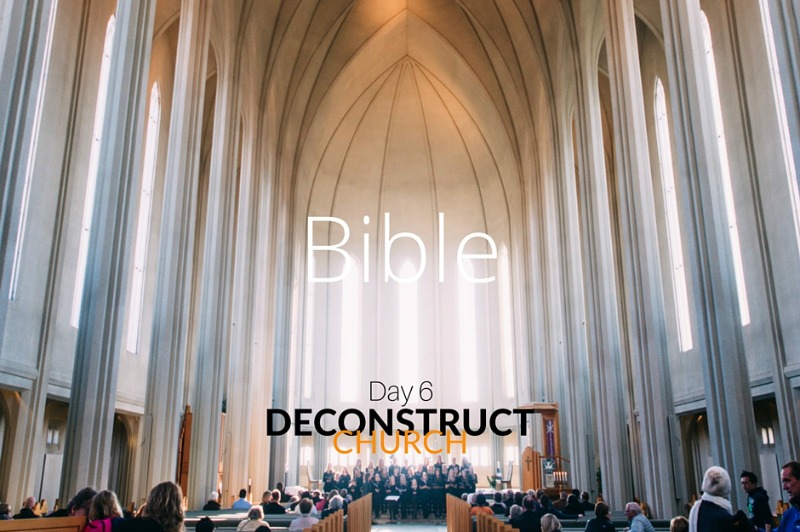I remember a point in my life, not a precise moment, but a time period, in which I realized that the Bible had a lot more in there than I had learned in Sunday School. I was probably 10. We were talking about Samson and his super powers and his kryptonite magic hair and I just had this strange feeling of confusion. I had to ask:
What does this comic book character have to do with Jesus?
There is no way I got a straight answer to that one. I really don’t remember if I even said it out loud, or if I just was struck by these stories and they just didn’t seem to be connected.
This was always my struggle with reading the Bible. It all reads so different. And I couldn’t see what so many of these passages had to do with the GOD who I knew and loved.
I wasn’t on my way to being a Marcionite. There was no Sharpie in hand and I wasn’t going to Jefferson my Bible. I just couldn’t see it. And I don’t feel like I ever got a good response in Sunday School.
That question clearly became something I focused on and has been a foundational part of my vocation. I want to know the story and share that story and help other people learn how to know and share that story with other people.
What is the Bible for us?
The question for us to explore has less to do with what the Bible is as an artifact, or even what the church often teaches us about the Bible (though all of that is important). To cover that would be its own 31-part series. Our concern must be more focused.
What is the Bible for the Church?
As I encouraged us to see the Church as the wider collecting of people with its mission and mutual intention, rather than merely an individual who believes, our concern must be for how the Bible impacts us as the Church, not so much us as individuals. Or, if we are speaking to our personal experience, we are doing so to highlight that part of the church who experiences like we do. For our faith may be deeply personal, our expression of that faith is necessarily communal.
With that we see the Bible as a collection of different books, written by hundreds and edited by thousands. It represents perhaps the most significant means of seeking to understand GOD at our disposal. It presents the many characters of GOD and tells the story of a people’s pursuit for better knowing GOD. It is old and yet can present a fresh perspective. It can be read and it can be heard and it can be prayed.
The church likes to say the Bible “contains everything necessary for salvation” which is a funny phrase, I think. Because it passes the book itself (or perhaps just the binding) as a container for GOD. Almost as if we’ve traded out the ark, first for the Temple, then centuries later, for a book of (sometimes crazy) stories. Holy stories. Family stories.
So this container holds it all, apparently. Strange, then, that the contents are stories about communities. Stories about people. Stories about a savior who comes to us whenever we aren’t alone, gathered in twos and threes. Do we mean everything in the literal sense? Or is it more like a marker? Dare we suggest that this unfinished collection of stories is all we need to get it? Or is it more like, when we read the Bible together, we get it?
What is necessary implies the minimum: a funny juxtaposition with the word everything which caps the potential. Everything is the upper limit while necessary is the bare minimum: the just getting by. It is also the urgency, the required, the hoped for, the ambition of possibility. The possibility of salvation!
Our communities of faith treat the Bible as being more than mere lessons. But the greater question may be: does our worship?
Ask Yourself
How do I allow myself to experience the Bible? Do I read it? Do I listen to it read? Do I read it out loud? Do I read it to other people? Have I read with others? Have we prayed with Scripture? Have I asked it questions? Have I made myself vulnerable before it? Have I stripped my heart naked and bared my soul to the Bible?
How often do I read it? How often do I reflect on my reading? How often do I journal or write down my thoughts after reading?
Do I read with another book? Is it a book that helps give a historical account? One that shares tradition and teachings of the Church? One that tells me how to read it or one that invites me to explore the challenging contours of the text?
Do I love the Bible? Do I love reading the Bible? Do I find hope inside? Love? Freedom? Compassion? Do I find GOD’s hope and love? Do I receive encouragement and direction? Does it help me see my own sin and need for repentance?
How do we use the Bible? Or do we simply make use of it? How does the church express adoration for the Bible? Or does it merely like to quote it?
We like to sing “they will know we are Christians by our love.” And from our own experience, that can be hit or miss. But I wonder…what if we applied a sort of reverse with the Bible. What would it mean if we were to say We will know you are GOD by your Bible? Which begs the ultimate question: do we even know GOD?
[This is Day 6 of How to start deconstructing church. The next in the series is “Old Testament”. To start from the beginning, read the introduction here.]


Leave a Reply